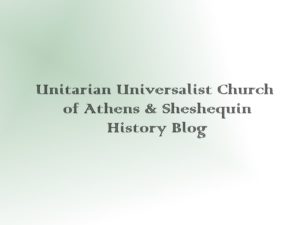Celebration of the Eucharist – also known as the Lord’s Supper, or communion – was a controversial topic in Universalist circles in the 1830’s and 1840’s. Some Universalists believed that the original “Last Supper” was a celebration of Passover, and that Christians were not obligated to continue Jewish traditions. Others believed that it was a new ritual created by Jesus and was intended for Christians to perpetuate. Others simply felt that the Eucharist should be celebrated to legitimize Universalism in the eyes of mainstream Christians – “to remove the prejudices of opposers of Universalism,” as the Rev. Aaron B. Grosh wrote in 1842.
In 1842, Sheshequin’s Joseph Kingsbury wrote to the editor of the Magazine and Advocate to describe the situation in his home congregation:
“BROTHER GROSH – You are aware from late information, that some difficulty has arisen in the society of Universalists in Sheshequin, in consequence of the efforts of their preacher to introduce the observance of the Eucharist in our church administration. I have been one of the strenuous opposers of this orthodox fashion.”
The Rev. Gustavus S. Ames was the settled minister at Sheshequin at that time. The conflict over the Eucharist was probably part of a larger discussion about whether to become a “church” or remain a “society.” While the difference between the two is not well-defined, a “society” was generally less formally organized than a “church.” Major W. H. H. Gore, a member of the society since childhood, recalled:
“About this time [1841] an effort was made to have a regular church organization, and through the efforts of Mrs. Julia H. Scott, succeeded in part. I can remember as a boy, probably about 1841, of the rite of baptism being performed, and Mrs. Scott was one of the persons baptised, also my mother, and undoubtedly it was at this time a church organization was formed. This was under the ministering of Rev. G. S. Ames.”
Baptism was another ritual that was controversial at the time.
Julia Kinney Scott, the famed Universalist poet, grew up in the Sheshequin Society and remained connected to it after her marriage and removal to Towanda in 1835. In a letter to a friend in January, 1841, she wrote:
“We have formed a little church in Sheshequin, and several are opposed to it. I have had a world of trouble about it. As I helped the matter on, they are displeased with me, but that I should not care for, if they could be brought into measure at last. Or, if some influential brother at the East could be persuaded to write some strong articles in favor of church organization and the Eucharist, and would send me the papers containing them, that I might show these people and convince them, how happy I should be.”
It appears that the institution of a church organization and celebration of the Eucharist was driven not only by the minister, but also by Kingsbury’s niece, Julia Kinney Scott. And it sounds as if Kingsbury were not alone in his opposition.
There is no record in the Sheshequin Universalist Society’s “Proceedings” of the formation of a church organization in 1841. A revised “Constitution, Rules and Regulations,” dated 1843, retains the name “Society.” Julia Scott died in 1842, and Ames left the congregation in June, 1843. It’s possible that this constitution was written after these two instigators were gone and that it affirms the congregation’s desire to remain a “society.”
At the annual meeting of the Society in January, 1845, a committee (which included Joseph Kingsbury) that had been appointed to obtain a legal charter of incorporation presented a draft document. The first article in the charter stated that the name of the association would be “The First Universalist Society of Sheshequin.” This charter was recorded in the county courthouse on May 12, 1845.
I do not know when communion became a regular celebration at the Sheshequin Universalist Society. The plaque on the building says that a formal church organization was formed in 1880. Communion was probably in place by then. The communion set that we used last Sunday was purchased by the society in 1932.


